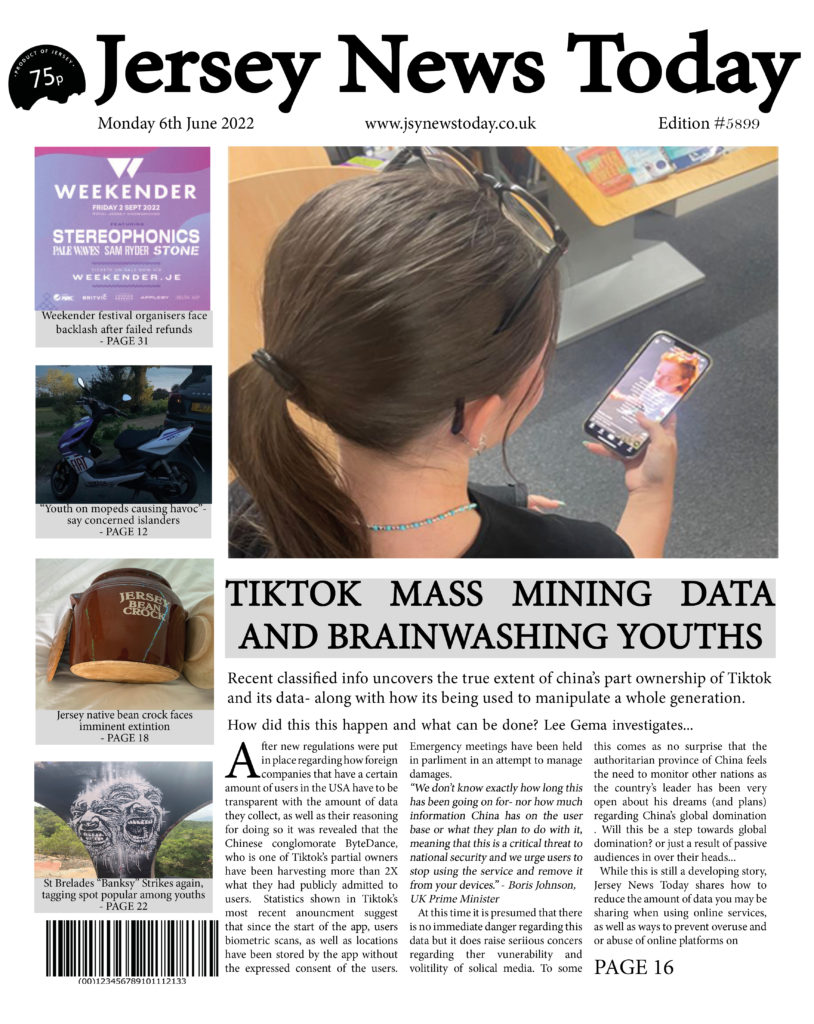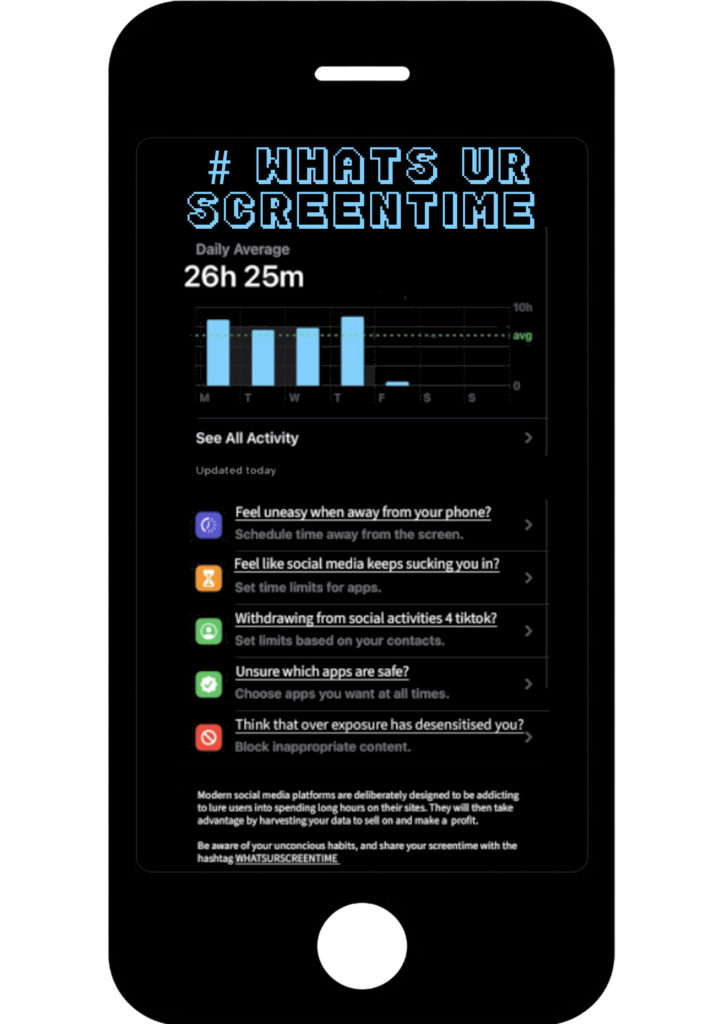
Front Cover Statement of intent
For my NEA i will be creating the front cover for a newspaper called Jersey News Today, using the style model` from the newspaper ‘The i’ which will feature a story about how Tiktok is actually part-owned by a Chinese entity ByteDance, which is harvesting mass amounts of data from unsuspecting users while also mentally affecting users with its addicting infinity scroll mechanic- while linking to theory’s such as Andrew Lewis‘ theory on how “If you are not paying for the product , then you are the product”, as well as Stuart Hall’s theory on passive audiences- leading on to Habermaus‘ theory on the private and public sphere regarded how this data breach lead Tiktok to go from peoples private spheres to the public sphere.
Along with this I will be producing 3 flyers aimed towards college aged students (16-20) to raise awareness about why you should be careful how much time you spend on your phone as well as how much data you share online
My front cover will feature a large masthead reading “The Jersey Times”. Below this will be a photo of someone using the app with the title “Tiktok mass mining data and brainwashing youths” below this will be the body article featuring the main story in around 250 words and will take up 1/3 of the page. Alongside this story will be 3 “plugs” referencing other stories inside the paper such as “Youths on mopeds causing havoc on Jersey roads” and “Jersey native bean crock faces extinction”
My newspaper will be aimed toward a primarily left-wing, libertarian audience by providing an unbias and unpolitical approach to reporting current events and news stories while still trying to make it interesting to engage the islanders who get bored of island life.
I will compose my articles on the blog and then add them into InDesign to arrange them, as well as use photoshop to alter images so that they are properly scaled and adjusted before adding them into Indesign.
Alongside this newspaper page I will be creating three flyers/posters to raise awareness of how modern social media apps are designed to hook the user, make them addicted and then harvest lots of their date to sell on for a profit. These flyers will include the hashtag #whatsurscreentime to encourage young people to post and open up about how much time they spend on their phones, leading to talks on how it could be a problem. I will be laying these flyers out in the style of the pages inside apples settings app as lots of young adults will be familiar will the layout thus engaging them further.
Task 1

Notes
- Tiktok uses infinite scroll to get users hooked
- Lots of research done by Tiktok to work out the ideal placement of buttons to ensure the user can keep scrolling effortlessly
Task 2
Plan for 3 flyers
- Make gen z aware of how they are being taken advantage of by big conglomerates
- Feature the hashtag #whatsurscreentime






Task 3
-Double Page Spread


First body of text
On the 18th of April 2022, EU regulations regarding enterprises use of the data gathered on their customers were updated as a result of continued misuse of by conglomerates, like Wonga, the payday loan company, which was hit by a huge data breach in 2017 that compromised the bank details of 250,000 customers. It is data breaches like this that bring to light these big companies lack of care for the privacy of millions of users data – which most of the time has being collected without user consent, solely for the company to sell to make a profit on.
As a result of this new legislation being implemented, many companies have been left scrambling to meet the month long deadline to get their databases in order with the new law- which includes citations such as . Not only does the new legislation contain new rules such as the amount of data companies are allowed to take on their users without validation/reason- but also includes strict new guidelines regarding the security in which said data is kept. This will be forcing thousands of companies with user bases exceeding 100,000 active users per annum to conform to the latest cyber security rules. In the cases of many of these companies, these strict new rules may come at great expense as consultations from cyber security have proven to be very expensive in the new era.
It was in March of this year when a small social media campaign started with the hashtag #whatsurscreentime, urging users to check their screen time to see which apps were suspiciously running in the background, as well as shedding light on the ways in which everyday apps harvest data from unknowing users to profit from their unethical sale and distribution. After this campaign became globalised, British MP’s were forced by excessive lobbying by the public to increase regulations regarding how companies handle users data.
This recent push for transparency among global leaders in social media led to exposure of one specific company – ByteDance. ByteDance Ltd. is a Chinese internet technology company headquartered in Beijing and incorporated in the Cayman Islands. Founded by Zhang Yiming, Liang Rubo and a team of others in 2012, ByteDance developed the video-sharing social networking services and apps TikTok and Chinese-specific counterpart Douyin. It was revealed that TikTok was ‘selling’ more than half of its database to the company- which included a lot more than is disclosed to the reader upon signing up to the platform.
Second Body of Text
This is not the first time social media giant Tiktok has been in the spotlight recently – in 2020 research into Tiktoks astronomical rates of global growth determined that a huge chunk of their recourses are allocated to finding and developing new ways to keep users swiping. This involves extensive research into the placement of buttons on the app in order to achieve the easiest user interface- a key factor in keeping the audience using for longer.
Alongside Tiktok’s addictive interface it was also found that the app has a team dedicated to researching into the algorithm used on the “For You” page of the app. This page is an endless scroll of videos that the app’s algorithm determines you will like. It has been dubbed as the most valuable digital real estate in the world. It is the core of what makes the app tik (pun intended). Every time the TikTok app is opened, notice that the user will land on the “For You” page and not its “Following” page. TikTok’s algorithm is designed to keep you coming back for more. With each video you watch, TikTok learns something about you. Within a few hours, it can detect your music tastes, sexual orientation, mental health, and sense of humour. So if you watch a video of a cute dog, TikTok will show you another pet video. This may seem harmless at first glance but it has recently proving a problem as studies have identified strong links between extensive mobile phone use and rising depression rates among teens. Upon extensive use of the platform users may find themselves getting roped into various tiktok trends and challenges, such as posting a montage of old pictures of themselves to show how they’ve changed – but this is where it becomes concerning.
Recently, TikTok made a change to its U.S. privacy policy, allowing the company to “automatically” collect new types of biometric data, including what it describes as “faceprints” and “voiceprints.” TikTok’s unclear intent, the permanence of the biometric data and potential future uses for it have caused concern among experts who say users’ security and privacy could be at risk. China is one of the most watched countries in the world, with 54 percent of the world’s cameras are located in China, which would equate to 540 million CCTV cameras as of 2021. This biometric data taken by Tiktok could be assumed many uses, the most prevailing being to build up a global database capable of recognising millions of people just by using Tiktok alone.
Tiktok doesn’t just take your biometric data- after a freedom of information request was put into Tiktok as a result of the new legislation it was found that Tiktok records your location even when you do not have the app open. However, it doesn’t stop there. Not only is Tiktok tracking your real-life activities, but they also track your online activities. Part of their impressive algorithm tracks what you do in other apps in order to narrow down the content shown to you in order to make it more personalized. This could mean tracking your search history, chats with friends, or frequently visited sites. Reports by white hat security experts (aka people who hack in order to test security boundaries and alert the public to threats) According to the outlet, their findings were verified by five independent experts. These studies contained info showing that Tikok collects more info than any other social network.
The “title” Tiktok has earned as the data harvesting kingpin has brought attention to the vulnerability of younger generations as many kids have been know to simply “not care” about the tabs being kept on them as it simply does not directly affect them
Third Body of Text
“Our integration with Tiktok is purely for the convenience of the user and TikTok’s data handling policing is not a result of our partnership/actions”
Why should I care about sharing my data?
Generation Z’s profound love for Tiktok has not only proven to be a wakeup call in regards to how excessive use social media can negatively affect your mental and physical health, but also shines light on how quick mega corporations are to exploit such a venerable generation for profit – while also creating problems such as self consciousness and unrealistic standards- but its not just large companies Alongside these personal problems that these new mediums of communication and entertainment create, there lies another problem of people simply just not caring about their privacy online- which can prove to be a problem later on for a few reasons. One being if someone gains enough information on you it can be used for exploitation. This is a particular problem on our island, because Jersey is one of the worlds most active financial hubs- making its residents extra venerable to being targeted by data harvesting and fraud. Being loose with your privacy makes you a massive target; and living in Jersey adds to those odds. According to Loop, the average person should at least be worried about the potential for identity theft.
Graph Caption
As data from this graph made by the BIOSMR (British Institute of Social Media Research) shows TikTok has had a sudden spike in users since 2017. This has a lot of likely causes, including the covid 19 induced lockdown that lasted around 2 years between 2020 to early 2022 which left a majority of the population stuck inside with not much to do apart from scroll endlessly to waste time online. It also shows Tiktok has exceeded 1 Billion active users, making it one of only 6 platforms to gain such a large audience.
Poster Caption
Ever since Facebooks infamous data breach of Facebook’s user info which left millions of users personal information up for viewing in 2014, an unknown group has started to raise awareness among social media users in an attempt to inform the public about how much information you really give out online as well as giving warning to the younger generations about how addictive social media is.
